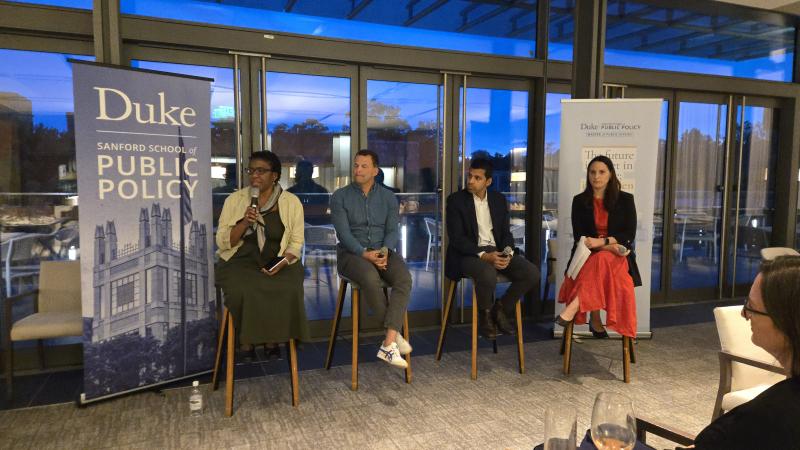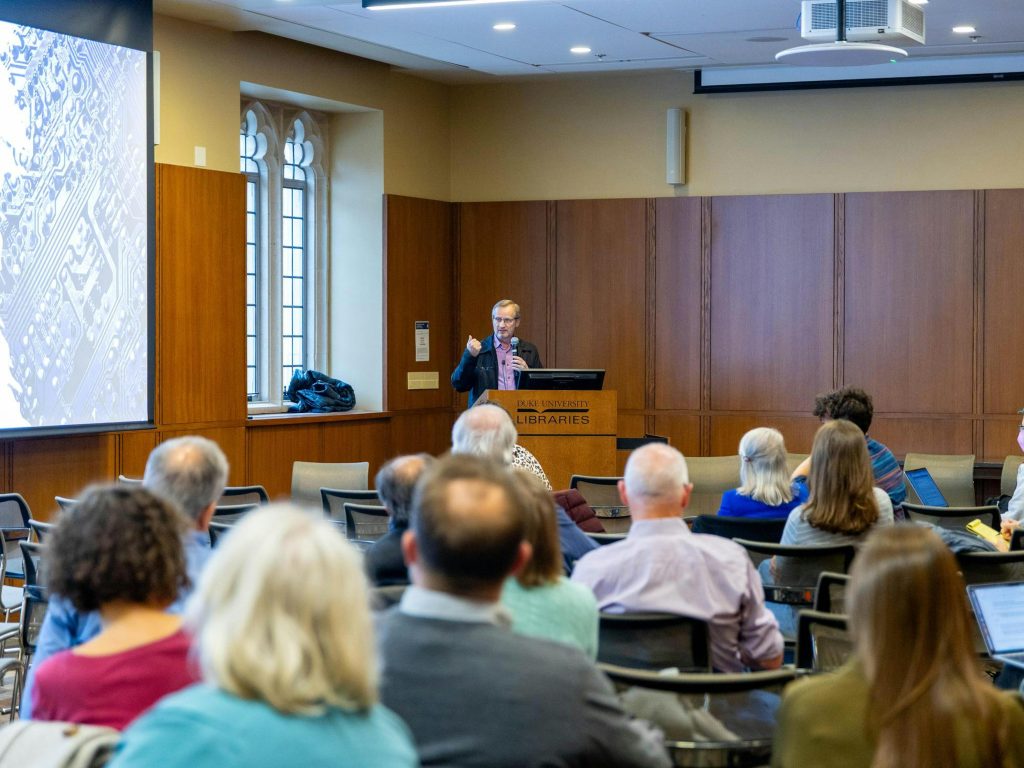A Hearing on Fairness and Common Sense On Tuesday, December 9th, the U.S. Senate Subcommittee on Intellectual Property held a hearing for the American Music Fairness Act (AMFA). Currently, the United States is one of the few countries that do not pay performing artists for terrestrial radio alongside Iran, North…
Research Areas
CYBERSECURITY
PLATFORM ACCOUNTABILITY
DEEP TECH
DATA BROKERAGE
DIGITAL OPPORTUNITY
AI & CREATIVE ECONOMY
What We Do
Executive Education

Executive education provides global certificate-based programs for a wide range of professionals, including the annual Cybersecurity Leadership Program in partnership with Pratt School of Engineering.
Course Work

Courses are offered by faculty across schools and programs for both undergraduates and graduate students with many cross-listed courses hosted by Science & Society.
Research

The Tech Policy Lab focuses on work in the five key research areas listed above in conjunction with academic and industry partners. The lab works closely with the Deep Tech Initiative.
Course Offerings
Spring 2026
- PUBPOL 586 / Usable Security and Privacy (Prof. Pardis Emani-Naeini) - We/Fri 1:25pm - 2:40pm
- PUBPOL 590 / Verification and Identity (Prof. Robyn Caplan) - Weds 12-2:30pm
- PUBPOL 590 / Technology & National Security (Prof. John Hillen) - Mon/Weds 11:45am - 1pm
- PUBPOL 590 / Stakeholders in Tech Policy (Prof. Tommy Sowers) - Weds 8:45 - 11:15am
- SCISOC 586 / Digital Intelligence (Prof. Sarah Rispin Sedlak) - Tu 10:05am-12:35pm
- SCISOC 615S / Privacy: Conc & Cul, Law & Pol (Prof. Jolynn Dellinger) - Mon 1:25-3:55pm
- SCISOC 690 - Innovation, Politics, and Society (Prof. Casey Mock) - Th 3:05-5:35pm
- BIOETHIC 606 - Communicating Science Policy (Prof. Emily Edwards) - Weds 12-2:30pm
- PUBPOL 255 - Introduction to Cyber Policy (Prof. David Hoffman) - Tu/Th 11:45 - 1pm
- SCISOC 590/PUBPOL 590 - Deep Tech & Sustainable Policy (Prof. Tim Profeta) - Th 8:45-11:15am
Projects

Women’s Perspectives on Cybersecurity
Ongoing
As cybersecurity becomes increasingly vital to national and economic security, building a diverse and inclusive workforce is more critical than ever. This research initiative examines the experiences, barriers, and aspirations of women in the cybersecurity field across Latin America. By gathering data directly from women in the field, this project aims to inform targeted policies and programs that promote gender equity and strengthen regional cybersecurity capacity.

AI & Music Streaming
Ongoing
Artificial intelligence and AI-generated music are affecting the music streaming industry globally. Human-created music is fundamental to society, social change, and democracy. This project examines the impacts of AI on career artists' ability to make a living, listener privacy, online safety, and exposure to new music in the US, EU, and UK. It also examines how the impact of AI on the music industry is a canary in the coal mine for how AI will impact the labor force.

AI for Metascience
Ongoing
Duke Deep Tech has partnered with OpenAI to establish the AI for Metascience research initiative, dedicated to understanding and leveraging AI's potential to transform scientific research. The program aims to explore how AI can accelerate scientific discovery through multidisciplinary collaborations bringing together experts from computational sciences, life sciences, social sciences, health sciences, policy, ethics, and humanities to create a holistic approach.
The technology policy concentration prepares students to assume positions in public service, the private sector, and non-profits dealing with public policy issues associated with technology innovation. These positions include roles as legislative staff, executive agency analysts, national security and law enforcement jobs, company government affairs managers, lobbying consultants, and civil society advocates. Technology continues to impact society across all industry sectors and aspects of daily life. Sanford’s focus on technology policy prepares students to address issues of government support for innovation and actions to mitigate the negative impacts that technology can make on individuals’ lives.
News & Media
Duke considers a new tech policy minor
The Afterlives of our Data: A Conversation with Author Mary Ebeling
Student Voices: Bridging Technology and Policy for the Public Good
Want to stay in the know about Duke Tech Policy events, lab opportunities, and course offerings? Join our email list by emailing dukecyberpolicy@duke.edu with your name.









